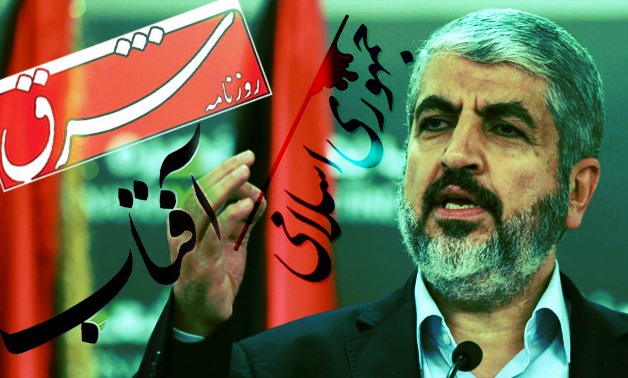
Khaled Mashal, former head of the Hamas political bureau, in the eyes of Persian press
CAIRO – 7 May 2017: Controversy erupted regarding the real intentions of Hamas following the release of its new manifesto on May 1.
Hamas, through the new policy document, has rebranded itself as an Islamic national liberation movement.
The new manifesto, read by the movement's former head, Khaled Mashaal, severs ties with the pan-Arab Muslim Brotherhood, which was outlawed by Egypt.
Iranian intellectuals and media outlets have been raising questions about Hamas, pondering a possible change in the relations between Tehran and the group.
The new manifesto was considered more moderate than its predecessors.
The Iranian press agreed to consider the new policy document a step away from Hamas’ “old friends.” Persian-based daily newspaper Aftab Yazd said events that complicated situations in the region and shifted the political scene indicate a change in the relations between Iran and Hamas.
The reformist newspaper published in Iran added that Hamas seeks to overthrow Syrian President Bashar al-Assad, unlike Iran; it also claimed that closer relations between Hamas and Saudi Arabia have worsened the situation between Hamas and Iran.
On the other hand, Khaled Qadoumi, Hamas' representative in Tehran, told Egypt Today in an interview that Hamas is still holding its stance on the Palestinian case.
Also, Iranian political analyst Sabah Zangana accused Hamas of normalization with the Israeli state since it accepted the establishment of a Palestinian state along the pre-1967 border; unlike Iran that has been against normalization with Israel; therefore, according to Zangana, there is a further gap between Hamas and the Palestinians.
Iranian newspaper Jomhouri Eslami (Islamic Republican) derided the new policy as “treason” against Palestine, saying Mashaal "backed away" from the Palestinian case.
Jomhouri Eslami newspaper of the former disbanded Islamic Republic Party in Tehran said the charter contradicts Hamas’ stance. Despite that the charter does not recognize Israel’s right to exist; it recognizes the pre-1967 border, which can tacitly be considered recognition of the Israeli state.
Shargh, the most popular reformist newspaper in Iran, said relations between Iran and Hamas have been shaky for quite a long time.
The Shargh article said Hamas got its hopes high when the Muslim Brotherhood took the reins of power in Egypt, but now, with the Muslim Brotherhood out of the political scene, Hamas rapidly came to realize its current position and tried to reconcile with Tehran. However, according to the article, these relations will not be the same.
Regarding the new policy, Qadoumi suggested to Egypt Today that the manifesto cannot be treated as being conclusive. Qadoumi feels it is more of a mere reflection of the movement’s burgeoning ideology.
On May 6, Ismail Haniyeh, deputy head of the Hamas political bureau and former prime minister of the Palestinian National Authority, was elected as the new leader of the Hamas political bureau.
Haniyeh succeeded Hamas’ longtime leader, Mashal, who announced in 2016 that he would not run for the position again.
Additional reporting by Israa Ahmed Fouad.

Comments
Leave a Comment